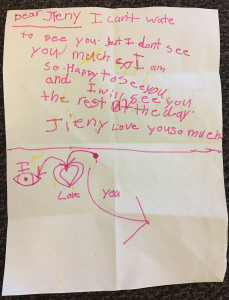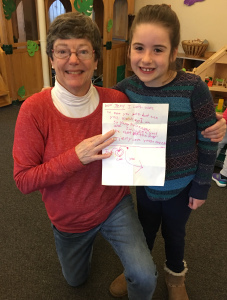K.D. Dowdall's Blog, page 43
February 26, 2018
An Interview with Charles F. French, Writer and Author, Part 1
Good day to you Professor Charles F. French! Thank you for taking time in your busy schedule, between teaching literature at two universities in eastern Pennsylvania and writing great horror novels! I just read your latest horror novel, Gallows Hill, and it is a blockbuster of a horror novel! I am very interested in discovering more about why reading, writing, and teaching is the love of your life. Thank you for answering the following questions. I know your readers are as anguish to know all about you as I am.
How old were you when you started reading books?
I was three years old I believe. I know I cannot remember not being able to read, and I know that my mom always read to me from a very young age.
What kind of books, when you were a child, interested you the most?
I loved reading any kind of adventure, fantasy, or science-fiction the most. By the time I was in elementary school, I remember reading the Tarzan series and several of the Jules Verne novels such as Journey to the Center of the Earth and Twenty Thousand Leagues Under the Sea.
What is the name of your favorite book when you were a teenager?
This is a more difficult question to narrow down to one at that time, but if I had to choose one, it was Narcissus and Goldmund by Hermann Hesse, a novel about two friends of different backgrounds and interests and how their lives intertwined. When I was a teenager, exploration of mysticism and spirituality, both issues in this novel, were a part of many people’s lives.
What was it that made you interested in writing books about horror stories?
I have enjoyed horror novels and movies since I was young. I read both Frankenstein and Dracula as a young teenager, and I always enjoyed the Universal Studios horror movies of the 1930s and 1940s. As I grew, I came to understand that horror in novels is often a metaphor for the true horror of the world. I do not see it as a way to escape reality, although reading is very useful to do that and it is fun, but as a prism or lens through which light can be focused on very real problems in life. Does that make sense? So, I have tried both to tell interesting stories in my writing but also to explore important problems in the world in them.
What made you want to be a professor of literature?
I originally wanted to be an actor. Theater was my first love in terms of profession, but I soon found out that I was not good enough to stand out from the others and unlikely to make a living from it. I also did not want to spend at least 20 years trying to make it as an actor. My whole life story is one of following unusual paths, but without going into great detail, I will say that I had dropped out of college, then after working as a steel-worker for several years, wanted to go back to school. I did return to college while working full-time as a janitor. I earned my degree as an adult student, and I realized then that I had both a talent and a passion for teaching, so my course was set.
Why do you think it is important to spend a great deal of your time mentoring?
I have had the good fortune in my life to have had several professors go out of their ways to help me when I needed it the most. As I have become older, I realized that not only do I have much to pass along as a teacher of literature, but also I can offer whatever knowledge I have to younger people, including adult students, about life, books, and writing. I hope I do not sound full of myself in this answer.
Tuesday, February 27 – Part 2 of my Interview with Charles F. French, Writer and Author!
*****NEW RELEASE LIVE ON AMAZON NOW!******
February 24, 2018
Remember to Register and Vote
Thank you Charles F. French! This is the most important thing to do – VOTE!
 charles french words reading and writing
charles french words reading and writing

If you are one of the people who was horrified by the recent tragedy of the Parkland, Florida school shooting and you wish to do something to enact changes in gun legislation, there is one crucial action or actions you should take: if you are not registered to vote, register immediately, and then vote.
There is no excuse for not voting–none. And if you want to enact gun control legislation, then do your research and find out where the candidates stand. The population of the United States consistently polls that it wants gun control, so act on your convictions.
Voting is one of the most powerful, if not the most powerful, tools in our democracy, and I hope the young people who are leading this fight also register to vote when they are 18 and then vote. If we, who want gun control legislation, do vote, then our voices…
View original post 22 more words
February 23, 2018
Love Note
This is such apart of what teachers do, they grow things, like the love of reading, love of learning and to love others, especially a beloved teacher, like Jennie. Awesome! Beautiful!
“Dear Jennie, I can’t wait to see you. But I don’t see you much. So I am so happy to see you and I will see you the rest of the day. Jennie I love you so much.”
I love you too, Scarlett. 
Jennie
February 22, 2018
So What is Wrong with America and So Right with Canada?
I asked myself why Canada has no School Shootings, No Concert Shootings, No Church Shootings, and Mall Shootings? Why are they without so much violence in their everyday lives and why does America have 33,000 deaths a year and Canada, all most none. What is the difference?
Canadians have lots of rifles and guns. They do lots of hunting of deer, caribou, quail, sometimes bears, and even wolves. So why is it we have so much violence everyday in our lives, in every city, town, and community in America. The difference is they have smart, common sense gun laws, they have diversity from every country, they care about their children’s lives, their families and friends. So, what is wrong with America?The Canadians have no weapons of war – no AR 15s, no AK 47s for one thing.
They don’t hate you for the color you are or what religion you are or how much money or power you have. So which country is more democratic: Canada! They also don’t have people dying without healthcare, although the wait line may be longer, kids don’t go hungry, they have good safe schools. So, what is wrong with America? A lot!
America is a democracy in name only. It has truly become a capitalist society, where the rich get richer, were Citizens United allows huge corporations to own our congress, and the white house. Where people like Trump can ruin everything that our Armed Forces have fought and given their lives for. The reason is we no longer have the following:
“We the People of the United States, in Order to form a more perfect Union, establish Justice, insure domestic Tranquility, provide for the common defense, promote the general Welfare, and secure the Blessings of Liberty to ourselves and our Posterity, do ordain and establish this Constitution for the United States of America.”
We no longer have a Constitution that lives. It died when the lust for money, the pursuit of power and a sickness called greed and the hate of diversity turned our nation into a savage land with the new Motto:
KIL L OR BE KILLED, WORSHIP MONEY, and HATE WITH VENGEANCE!
***I would like to thank Debbie Gies for the photo of Canada life, with good gun laws that prevent mass shootings shown upon, she had it on her Facebook page and now it is here. Thank you Debbie! She is so wise and smart!
A Few Bits Of Good News On The Environment
Thank you Jill, for posting this great news! reblogging! Karen
Yesterday the high temperature where I live was 76° (F), 24° (C). Yesterday was 20 February 2018. It is never 76° in my area in February, nor in March. The average high temperature for this time of year is 43°. Perhaps by mid-April we see temps in the 70s on occasion, but never, ever in February. Now, admittedly I enjoyed the warmth of the day — Miss Goose and I went for a nice walk … I only managed 3.2 miles, but she went 5.6, and we both felt good about our accomplishments after a winter of inactivity, but … You don’t believe in global warming or in climate change? Well, I do.
 For one thing, when nearly all of the world’s climate scientists confirm the same data and draw the same conclusion, I am convinced, for they are the experts, not me, not Donald Trump, Rick Perry or Scott…
For one thing, when nearly all of the world’s climate scientists confirm the same data and draw the same conclusion, I am convinced, for they are the experts, not me, not Donald Trump, Rick Perry or Scott…
View original post 922 more words
The Old Lie
If bloggers read this, please note, if you have an AR 15, you are not a “A well-regulated militia” by the United States of America as it states in our constitution. So, that means you should not have a weapon of war. If you wish to un-follow – please do.
 charles french words reading and writing
charles french words reading and writing
Please, in the name of the victims of the most recent school shooting in Parkland, Florida, let us begin to do something to change the national insanity of gun deaths.
Stop with the old lie — “guns don’t kill people, people kill people.” It is illogical, fallacious, wrong, and stupid. Guns are weapons and are designed to expel bullets that are intended to kill. That is their purpose. That is why they exist.
Guns kill people.
Guns are not used to make paintings; they are not used to drive screws into wood; they are not made to make omelets; they are not created to write letters; and they are not aimed at making sculptures.
Guns are made to kill. That is their purpose.
The United States has a history of gun ownership based on the 2nd Amendment. As I would say to my students, please do a close reading, parse…
View original post 69 more words
February 21, 2018
Thematic Concepts in Fantasy Fiction
[image error]Fantasy for children and teens, especially now with the fear of being shot at school, is especially important during heart rendering and traumatic events in a child’s life. Fantasy and fairy tales do many things emotionally and psychologically to help the child to understand the world in a broader sense. Fantasy teaches and the individual learns about the world and life itself.
An example of a thematic concept or theme, as depicted in the fictional novel: Delphi Altair, Strange Beginnings, is presented when twelve-year-old Megan Donnelly’s mother has recently passed way. Megan, devastated by the loss of her mother, receives a mysterious package to be opened on her thirteen’s birthday. Inside the package is a very old leather-bound journal with mysterious symbols on the cover.
Megan begins to read the secret journal about a young girl named Delphi Altair and discovers that Delphi has suffered the loss of both of her parents. Megan can now relate emotionally, and with empathy, to Delphi’s grief and a bond of understanding is created. However, before you begin to read the secret journal, writes the author of the secret journal, you must put aside the world as you see it because things are not at all, what they appear to be. This statement suggests that although death seems final, a belief that life and death are not simple concepts, that there is, perhaps, and a reason to believe that “all is not lost”.
When a child is suffering a traumatic loss, such as the loss of a much-loved parent, the need to remain close to the lost loved one is paramount to healthy healing. By providing a tangible source of comfort, such as a fictional companion to create empathy and understanding, her mother keeps her child engaged in the present as well as the future in a way that will help to heal her child’s heart.
February 19, 2018
Quotes: Be The Change We Seek!
Our young people have more common sense & courage then 40% of adults.
Politicians that are bought and paid for, are Puppets of the Greedy!
We can’t pray away gun massacres, but we can change our laws to stop them.
February 18, 2018
Three Secrets to Great Storytelling!
3 SECRETS TO GREAT STORYTELLING as presented on Writer’s Digest. I found this article by Steven James helpful in forming the structure of scenes. (this is a re-blogging from 2014 but I thought it deserved a revival now, because it is simple, straightforward, and to the point.)
As a novelist and writing instructor, I’ve noticed that three of the most vital aspects of story craft are left out of many writing books and workshops. Even bestselling novelists stumble over them – Steven James But they’re not difficult to grasp. In fact, they’re easy.And if you master these simple principles for shaping great stories, your writing will be transformed forever. Honest. Here’s how to write a story.
Secret #1:
CAUSE AND EFFECT ARE KING.
Everything in a story must be caused by the action or event that precedes it. As a fiction writer, you want your reader to always be emotionally present in the story. But when readers are forced to guess why something happened (or didn’t happen), even for just a split second, it causes them to intellectually disengage and distances them from the story. Rather than remaining present alongside the characters, they’ll begin to analyze or question the progression of the plot. And you definitely don’t want that. When a reader tells you that he couldn’t put a book down, often it’s because everything in the story followed logically. Stories that move forward naturally, cause to effect, keep the reader engrossed and flipping pages. If you fail to do this, it can confuse readers, kill the pace and telegraph your weaknesses as a writer.
Secret #2:
IF IT’S NOT BELIEVABLE, IT DOESN’T BELONG.
The narrative world is also shattered when an action, even if it’s impossible, becomes unbelievable. In writing circles it’s common to speak about the suspension of disbelief, but that phrase bothers me because it seems to imply that the reader approaches the story wanting to disbelieve and that she needs to somehow set that attitude aside in order to engage with the story. But precisely the opposite is true. Readers approach stories wanting to believe them. Readers have both the intention and desire to enter a story in which everything that happens, within the narrative world that governs that story, is believable. As writers, then, our goal isn’t to convince the reader to suspend her disbelief, but rather to give her what she wants by continually sustaining her belief in the story. The distinction isn’t just a matter of semantics; it’s a matter of understanding the mindset and expectations of your readers. Readers want to immerse themselves in deep belief. We need to respect them enough to keep that belief alive throughout the story.
Secret #3:
IT’S ALL ABOUT ESCALATION.
At the heart of story is tension, and at the heart of tension is unmet desire. At its core, a story is about a character who wants something but cannot get it. As soon as he gets it, the story is over. So, when you resolve a problem, it must always be within the context of an even greater plot escalation. As part of the novel-writing intensives that I teach, I review and critique participants’ manuscripts. Often I find that aspiring authors have listened to the advice of so many writing books and included an engaging “hook” at the beginning of their story. This is usually a good idea; however, all too often the writer is then forced to spend the following pages dumping in background to explain the context of the hook.
IN CONCLUSION
By consistently driving your story forward through action that follows naturally, characters who act believably, and tension that mounts exponentially, you’ll keep readers flipping pages and panting for more of your work.
Into the Heart of the Soul
In the heart of the soul,
Never a blank slate,
With questions laid bare,
Are carried there,
Our secrets not shared,
Grasping at straws,
A struggle of soul,
With trials and travail,
To understand how frail,
Our hearts so veiled,
In the heart of the soul,
A revelation is heard,
A memory of youth,
Reveals a blade of truth;
To yourself, be true.
K. D. Dowdall 2018







